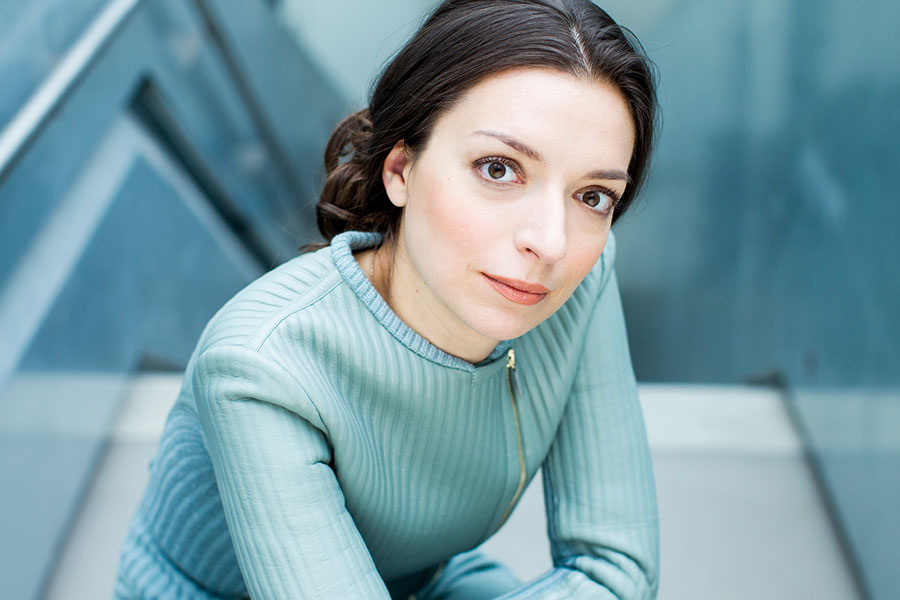Giancarlo Guerrero, a native of Costa Rica, is a five-time Grammy award-winning Music Director of the Nashville Symphony Orchestra, a post he has held since 2009 and recently committed to through the 2024-25 season. Guerrero previously held posts as the Principal Guest Conductor of The Cleveland Orchestra Miami Residency from 2011 to 2016, Music Director of the Eugene Symphony between 2002 and 2009, and Associate Conductor of the Minnesota Orchestra from 1999 to 2004. The Narodowe Forum Muzyki is extremely pleased with the appointment of Giancarlo Guerrero to the position of Artistic Director of the Wroclaw Philharmonic taking effect for the 2018-2019 season! Maestro Guerrero will spend eight weeks per season with the orchestra in addition to touring and recording activities.
Yulianna Avdeeva began piano studies with Elena Ivanova at Moscow’s Gnessin Special School of Music and later studied with Konstantin Scherbakov and Vladimir Tropp. She won the Bremen Piano Contest in 2003, the Concours de Genève in 2006, and the Arthur Rubinstein Competition in Poland, but her greatest achievement was winning the Chopin Competition in 2010. Deutsche Grammophon featured Ms Avdeeva, in 2015, as part of a milestone collection dedicated to the brightest winners of the Chopin Competition between 1927 and 2010. Avdeeva's Chopin performances have drawn particular praise and her association with the Fryderyk Chopin Institute has won her a huge following in Poland. She released a recording of the Chopin concertos with the Orchestra of the Eighteenth Century and Brüggen and her third solo recording, featuring works by Bach, was recently released on Mirare.
Anton Bruckner composed his String Quintet in F major in 1878 after receiving a commission from Josef Hellmesberger Sr., director of the Vienna Conservatory and concertmaster of the Vienna Philharmonic. The piece was not premiered until 1885, however, it quickly became one of Bruckner’s most frequently performed compositions. As a chamber composition it is unique amongst Bruckner’s output, otherwise devoted to symphonies and liturgical works. Thus the Quintet, composed for a pair each of violins and violas, plus cello, shares much in common with Bruckner’s symphonic catalogue. The work features passages of vigorous counterpoint, chromatic harmonies, and a Wagnerian approach to motifs, in addition to references from Austrian folk music.
The Quintet’s third-movement Adagio, conceptualized in its original form as a scaled-down version of a full symphony orchestra, lends particularly well to adaption for full instrumentation. Music critic, Wilhelm Altmann, wrote in his Chamber Music Handbook for String Players, “If the only thing Bruckner had ever written for string instruments had been the slow movement to his string quintet, his reputation would have been secured for all time… The Adagio takes one directly to heaven. This is music of affirmation and there is no sense of resignation to an inevitable and unwished for fate.”
Frédéric Chopin began his Second Piano Concerto in 1829 and completed it in 1830. While it is known as his Second Piano Concerto, this work actually pre-dates the Concerto in E minor, now accepted as Piano Concerto No. 1, by about six months. When Chopin performed the solo of the Second Piano Concerto at its premiere, in Warsaw, on March 17, he was immediately hailed as a national hero. Remarkably, however, Chopin’s reputation as a pianist is based on a mere thirty to forty concerts. He disliked playing to large crowds and in big concert halls and after settling in Paris he performed in public only twice a year. Chopin made a career writing small-scale piano pieces and never thought of composing a symphony. It is only in his two piano concertos, composed as showcases for a travelling virtuoso, that he even attempted to write for orchestra. His style is evidence of his keen understanding of the relationship between improvising and composing. From childhood, he had been making up his own music and his natural playing style translated into compositions with extraordinary sensitivity to colour, dynamics, and tempo.
Witold Lutosławski was born in 1913 in Warsaw, however, at that time the city was not Polish, but part of the Imperial Russian province of Vistulaland. In 1915, in order to escape the advance of Hindenberg's army from East Prussia, the Lutosławski’s fled to Moscow. There they fell instead into the Russian Revolution. Lutosławski studied piano and the violin and later composition with Witold Maliszewski, who also became his professor of composition at the Warsaw Conservatory during the 1930s. During the Nazi occupation, Lutosławski supported himself and his family by performing at the Warsaw cafes with the Panufnik. The composer later emerged as one of the most prominent of 20th-century. His honours include the Koussevitzky, Herder, Ravel, Sibelius, Grawemeyer and UNESCO Awards, as well as the Gold Medal of the Royal Philharmonic Society in London, the Polar Music Prize and the Kyoto Prize. He also received the Order of the White Eagle, the highest Polish state distinction. He died in 1994.
Lutosławski’s Third Symphony, written between 1981 and 1983, is widely acknowledged as the climax of the composer’s work. The piece, dedicated to Sir Georg Solti, was premiered on September 29, 1983, by the Chicago Symphony Orchestra. Following the performance, a critic wrote, “This piece is exactly what might be expected from a Polish composer at the moment.” This was a clear reference to the martial ruling of Poland from December 1981 until July 1983. The Third Symphony earned Lutosławski an underground award from Solidarity’s Committee for Independent Culture in 1983. However, the composer subsequently denied having deliberately depicted the feelings of suffering Poles saying, “If we agree that music can mean anything extra-musical, it nevertheless remains ambiguous meaning. But man has a single soul and whatever he experiences in life, must have some influence on him. If man has a single psyche, then the world of sounds, despite its autonomy, is still a function of that psyche. So I would limit myself to stating that if the last movement of the Symphony makes the impression it makes and keeps the listener in suspense, it is certainly not by chance. I would admittedly feel honoured if I managed to express something connected not only to my personal experience but also to that of other people.”
Alixandra Porembski, English Language Annotator




